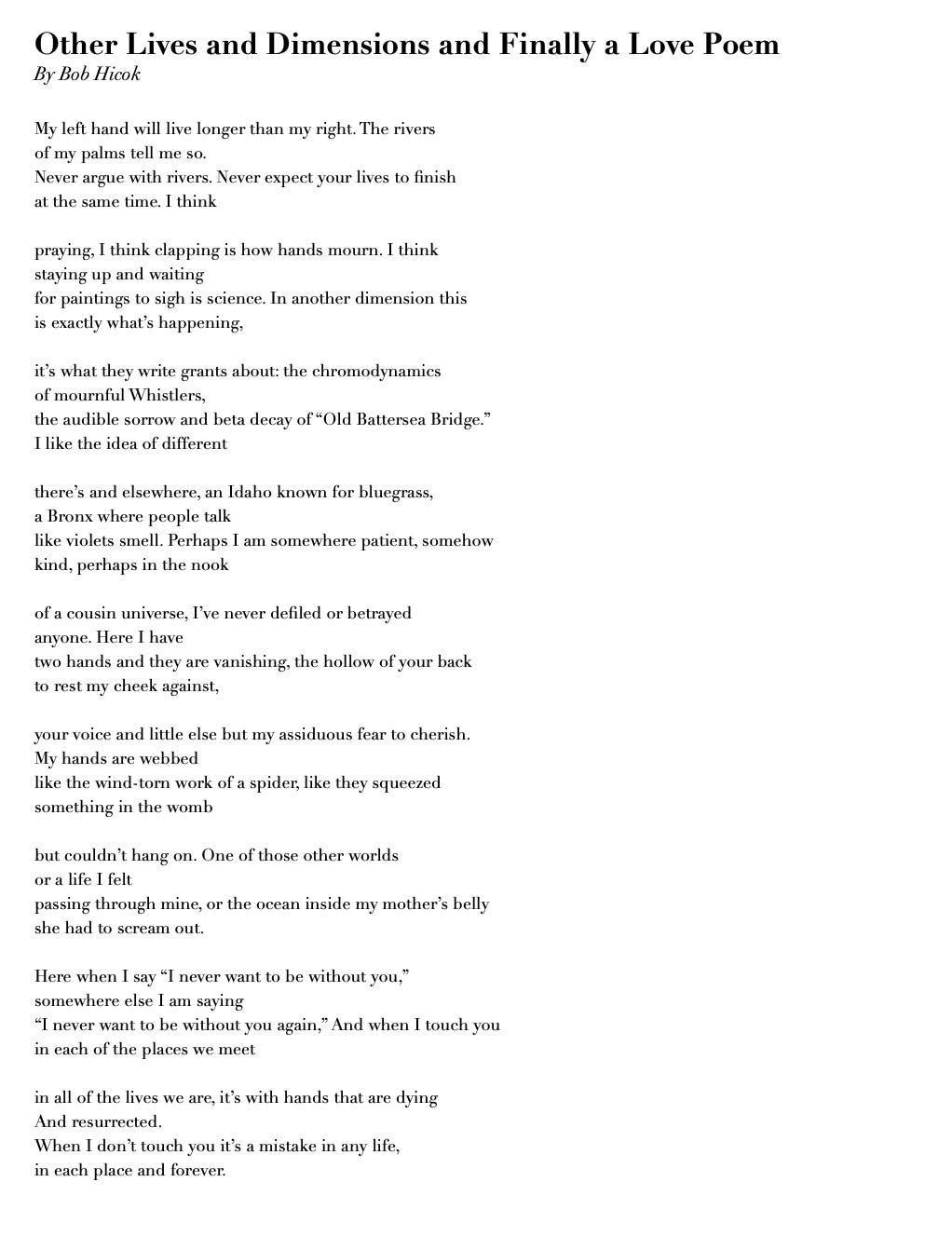A Poem I Love
“Other Lives and Dimensions and Finally a Love Poem” by Bob Hicok
I love this poem so much, I wanted to share it with you. I discovered it the other day somewhere I was scrolling (one point for scrolling). I don’t remember where I was scrolling because scrolling is all the same everywhere (one point against scrolling). I’ve now ordered the collection in which it originally appeared, Plus Shipping. In addition to that, I’ve also read it over and over and aloud several times, written it down by hand, and typed it out here for you.
The title tells you just what it you’re about to get: a meditation on the parallel universes and dimensional laws we may not ever fully understand that finally resolves into a love poem. The first line of the first stanza begins with a statement that makes no rational sense. It also contains the first appearance of our speakers hands. It is a first line that says, things that seem impossible may very well be true, while also saying, touch the world and find out.
Of course, We experience the world through sight and sound and scent and taste and touch—it is through these senses that we put together a vision of reality, that we write the rules. But what if the ground we stand on—the reality we create—is not so solid? What if paintings can sigh? The speaker says it wouldn’t be so absurd. In fact, it’s what scientists are studying right this very moment. He calls on quantum mechanics, wherein matter cannot always be defined in one way or another, where something can be two things at once, where the sorrow of a painting like “Old Battersea Bridge” might actually become audible.
This idea of multiplicity picks up speed, and he imagines entire alternate worlds. Continuing to play with the senses, there is “a Bronx where people talk / like violets smell.” He trips through these imaginings, like they’re occurring to him as he goes. The momentum seems to be building, but then his thoughts turn inward. He thinks of himself in a “cousin universe,” a place where he’s “never defiled or betrayed / anyone,” and the use of enjambment here is so stinking! First, he imagines a world where he hasn’t defiled or betrayed. The thought stays general until the next line, which begins with that hanging “anyone,” that forced admission that there was someone on the receiving end of his bad behavior. His shame is tangible as the line continues, “Here I have.” Here in this universe, he has defiled and betrayed. He has! But his “I have” also refers to his “two hands” as the next line begins, and suddenly there is a “you.” A you with the hollow of a back to touch, and our speaker has the hands to touch it.
I love this next section for how frenzied it feels with vanishing hands, hollows of backs, cheeks rested against voices. It captures the fervor of physicality, the realm of the hands, but also continues to play with the other senses. The voice of the “you” becomes solid. But as the fervor builds, there is a break. Our speaker has a “fear to cherish,” which is, of course, a fear to lose. His hands are back from the hollow, but they are grasping. They are webbed, but ineffective, “like the wind-torn work of a spider.” We return with him to the womb and are faced with a hazy primordial memory of other lives and other worlds “passing through” him. In this moment, I think the speaker is struck and almost paralyzed by the what could have beens and could bes that died with his birth, or that were born in some other elsewhere he cannot ever know. His mother, containing all of this “had to scream out.” It may be too much.
The love poem arrives just in time. In the face of all this multiplicity—in this think-about-it-too-long-and-it’ll-bend-your-brain realm—there is constancy in his love for the “you.” Here, in this world, he says, “I never want to be without you,” and elsewhere he says, “I never want to be without you again,” a slight difference to be sure—a different starting point—but the same end. In all of the different places they may be, simultaneously or centuries apart, anywhere and everywhere, they must be together. He touches his love with those hands that will die, that are redeemed and resurrected, that contain all possibilities and that ground him nonetheless. And if he doesn’t, “it’s a mistake in any life, / in each place and forever.”




this was beautiful! i didn’t realise i was holding my breath until the last line washed over me
Oh wow thank you for sharing your thoughts on the poem ! I liked every part of it!🫂